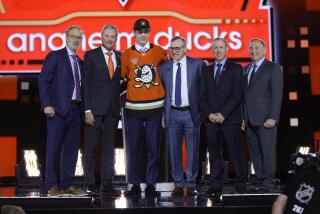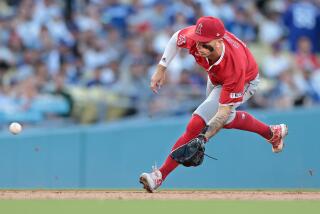Las Vegas’ Bonk Looks Like Sure Bet to NHL : Hockey: Czech performed well at 17 in the International Hockey League. Now 18, he is rated the top prospect for Tuesday’s draft.
- Share via
The story would be extraordinary enough without its setting.
A young man of 17--no more than a boy, really--signs a contract that pays him $100,000 a year to play minor league hockey.
And the setting is Las Vegas.
And the boy is from the Czech Republic.
His name is Radek Bonk, and he hushed a horde of doubters this season by becoming a star for the Las Vegas Thunder in the International Hockey League at the age of your typical high school senior.
By day, he practiced, napped and dined on Czech dumplings, goulash and chicken with paprika sauce cooked up by his mother. By night, the 6-foot-3, 215-pound center played hockey in the Thomas & Mack Center, an arena that Tark the Shark ruled not so long ago.
Out in the hallways, an autographed, limited-edition poster of Bonk could be yours for a price equal to his jersey number--$76. The team sold 400, and has more in storage to sell when his fame increases.
After all, it is only now, having turned 18 in January, that Bonk is eligible for the NHL draft, which begins Tuesday in Hartford, Conn. Rated as the top prospect by the NHL’s Central Scouting service, he is projected to be among the first few players chosen. If the Florida Panthers don’t make him the No. 1 pick--and there is speculation the Panthers might prefer versatile defenseman Ed Jovanovski--he would be there for the Mighty Ducks to take second.
However, Duck General Manager Jack Ferreira is seriously considering trading the pick if he can get an established young player and another pick in the top 15 in return. And the Ducks are so wary of the anticipated contract demands of the top picks that club president Tony Tavares says, “We’re going to stay away from anyone who has placed a highly unrealistic demand for his services.”
But should the Ducks have an opportunity to pick Bonk and pass, they would probably be second-guessed for a long time.
“He’s going to be a star,” said Duck General Manager Jack Ferreira, not usually prone to hyperbole. “He’s big and strong, a point-getter, a potential 90-100 point guy in the NHL. He’s got a lot of tools, and he’s played in a very competitive league.”
Imagine a 17-year-old power-hitter in triple-A, or a high school basketball player starting in the CBA, and you have an idea of the amount of certainty scouts have about Bonk’s future. They are not forced to try to compare a high school skater in Massachusetts to a junior player from Quebec to a college kid from Minnesota to a 23-year-old from Chelyabinsk.
The only 17-year-old center to make a bigger leap than Bonk was Wayne Gretzky, who signed with the Indianapolis Racers of the World Hockey Assn. in 1978.
And since 1979, when the NHL absorbed four WHA teams, no other 17-year-olds have played professionally in North America. When Bonk started the season in Las Vegas, he became the youngest person ever to play in the IHL.
Bonk had 42 goals and 87 points this season, playing against pros often a decade older than him. The IHL is full of players just shy of the NHL level--or just past it, like Bonk’s teammate Brent Ashton, who at 33 has 998 games of NHL experience.
“One thing about him, you cannot criticize what he’s done. He’s done it a a higher level than anyone else,” said David McNab, director of player personnel for the Ducks. “And he was a marked guy in that situation. On that Vegas team, he’s playing with, not really NHL prospects anymore but a lot of great minor league players, and some who have a chance to get back to the NHL. For an 18-year-old to fit in would be difficult.”
Even Bonk’s coach, Butch Goring, a former King who has since taken a coaching job with the Denver Grizzlies of the IHL, had his doubts.
“I was very skeptical about whether an 18-year-old could compete in this league,” Goring said. “At the start of the season, I thought he’d get 15 or 20 goals. I thought the pace would be very difficult for him.”
Bonk arrived in Las Vegas through the connivance of Bob Strumm, a fast-talker with an eye for a loophole who was hired as general manager of the first-year team.
“When I was interviewing for the job, we talked about how to win as an independent, and they said, ‘What younger guys are available?’ ” Strumm said. “Just as a stab in the dark I said, ‘The best young player in the world is Radek Bonk, and he’s underage. There’s only one way to get a first-round pick on our team, and that’s to sign him before he’s drafted.”’
Having thus stuck his neck out, Strumm was hired.
“Sometimes if you don’t stick your neck out, you don’t get your head above water,” he said.
He was able to sign Bonk through agent Michael Barnett. So it was that Bonk, speaking almost no English, came to Vegas--along with his mother, Anna, who does the cooking and washing, and his father, Jaroslav, who did the driving until Radek got his license.
“We came with him because we are worried about him,” his parents said through an interpreter, carefully adding that he stayed away from casinos and “is just normal.”
There have been no reports to the contrary.
“There are no Radek Bonk off-ice stories that have come around my way, and a lot of people would have been willing to spread Radek Bonk stories all over the wire,” McNab said. “A lot of Europeans have come over and had problems the first year, and here’s a guy who’s been dropped into Vegas. He was making $100,000 but he probably had a lot more than that through other sources. You’ve got to give him credit.”
Still, speculation that the Panthers might pass on him as the No. 1 pick escalated during the season after then-General Manager Bob Clarke was quoted saying it was “stupid” for Bonk to play in the IHL instead of in the Canadian junior leagues, as most prospects do. Most prospects do not, of course, get paid $100,000 at Moose Jaw, Regina or Saskatoon.
“He should be playing junior hockey. It’s stupid for him to play here,” Clarke said. “He’s playing against men. They’re bigger, stronger, better players than he is.”
The Florida Panther cap that Bonk had been wearing in hope of going No. 1 quickly disappeared.
“I’m not sure he’s not a little bitter with that,” Goring said. “I don’t think Bobby Clarke meant to slight him, but I think Radek feels that he did. I think (Bonk) did the right thing because he is better preparing himself (for the NHL). In junior hockey, you play 45 minutes a game, and you pace yourself. Here, you play 25 minutes and you play hard, you have to keep up your intensity.”
Strumm dismissed the issue.
“When Bob was 17 and playing in Flin Flon, if somebody offered him 100 grand to go to Vegas, Bobby would have turned it down? Give me a break.”
What Clarke thinks no longer matters, of course. He has since returned to the Philadelphia Flyers, and Panther President Bill Torrey will make the decision.
The scouts’ game is to predict the future, usually by describing a player as the “next” whoever.
“I don’t think there is anybody he is really going to be like,” Goring said. “I don’t think he’s going to be like (Eric) Lindros. I don’t think he’ll be as physical. They talk about him being like (Mario) Lemieux; I don’t know that he’s going to be a Lemieux. Lemieux at this stage was a better skater than Radek is.
“My own feeling if I was going to say, I think he’ll be more like Phil Esposito. I think Phil was a very gifted goal-scorer and I think Radek can be. I think Phil was deceptively fast, and I think Radek is. He’s not a fighter. But he’s not scared to hit, he’s not scared to retaliate. Phil wasn’t a fighter either.”
Rumor has it that Bonk once decided to fight and put up his dukes--without dropping his gloves.
“I like when players play hard. I don’t like fighting,” he said.
His strengths are his size, good hands and a flair for the open ice. He is a playmaker and a finisher. His weakness is said to be his skating, but even if he lacks grace, he usually manages to get where he needs to be.
Bonk’s English has improved, and where it doesn’t take him, his shy smile will. But when he chatters with the officials, he admits, it is not an indication that his vocabulary has grown.
“I talk to them in Czech,” he said, “because they don’t understand.”
Goring can appreciate that.
“A lot of the time,” Goring said, “just from his mannerisms, you can tell he’s still a boy.”
More to Read
Go beyond the scoreboard
Get the latest on L.A.'s teams in the daily Sports Report newsletter.
You may occasionally receive promotional content from the Los Angeles Times.






